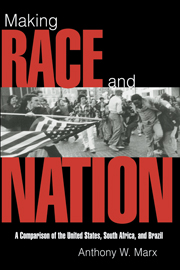
-
Select format
-
- Publisher:
- Cambridge University Press
- Publication date:
- June 2012
- December 1997
- ISBN:
- 9780511810480
- 9780521584555
- 9780521585903
- Dimensions:
- (228 x 152 mm)
- Weight & Pages:
- 0.754kg, 412 Pages
- Dimensions:
- (228 x 152 mm)
- Weight & Pages:
- 0.6kg, 412 Pages
- Subjects:
- Sociology of Race and Ethnicity, Politics and International Relations, Comparative Politics, Sociology
You may already have access via personal or institutional login- Subjects:
- Sociology of Race and Ethnicity, Politics and International Relations, Comparative Politics, Sociology
Book description
Why and how has race become a central aspect of politics during this century? This book addresses this pressing question by comparing South African apartheid and resistance to it, the United States Jim Crow law and protests against it, and the myth of racial democracy in Brazil. Anthony Marx argues that these divergent experiences had roots in the history of slavery, colonialism, miscegenation and culture, but were fundamentally shaped by impediments and efforts to build national unity. In South Africa and the United States, ethnic or regional conflicts among whites were resolved by unifying whites and excluding blacks, while Brazil's longer established national unity required no such legal racial crutch. Race was thus central to projects of nation-building, and nationalism shaped uses of race. Professor Marx extends this argument to explain popular protest and the current salience of issues of race.
Reviews
‘… Marx's book is the only systematic and detailed comparison of race and racism in all three countries yet to appear … his bold and provocative argument illuminates an important and previously neglected facet of the comparative history of race relations. He has brought the state into the discussion of how race is made in a way that will make it impossible to ignore in the future’.
Source: The New York Review
Contents
Metrics
Altmetric attention score
Full text views
Full text views help Loading metrics...
Loading metrics...
* Views captured on Cambridge Core between #date#. This data will be updated every 24 hours.
Usage data cannot currently be displayed.
Accessibility standard: Unknown
Why this information is here
This section outlines the accessibility features of this content - including support for screen readers, full keyboard navigation and high-contrast display options. This may not be relevant for you.
Accessibility Information
Accessibility compliance for the PDF of this book is currently unknown and may be updated in the future.


